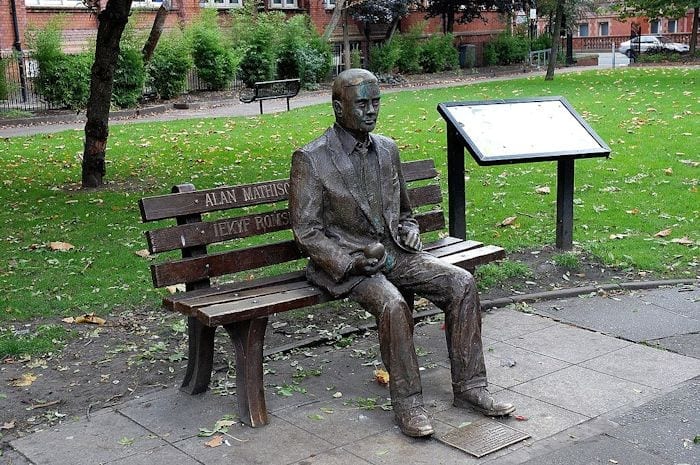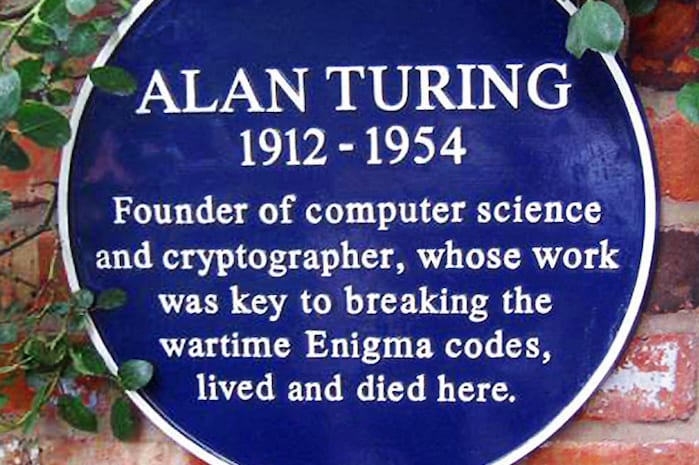The new £50 note: the Manchester contenders
- Written by Ray King
- Last updated 6 years ago
- People, Sport

Who will your money be on? Or more to the point, who will be on your money?
The Bank of England has announced that the new polymer £50 note will feature the portrait of an eminent British scientist and asked the public to offer suggestions via the Bank’s website over the next six weeks.
Amongst the early favourites is the mathematician and codebreaker Alan Turing, considered to be the father of modern computing and artificial intelligence, who worked at Manchester University from 1948 until his apparent suicide, aged 41, in 1954.
Turing had been convicted for indecency at a time when homosexual acts were regarded as a crime and accepted “chemical castration” rather than a jail sentence.
One of Turing’s most enthusiastic backers, John Leech, former Liberal Democrat MP for Withington, who campaigned for his posthumous pardon, said: “It is almost impossible to put into words the difference that Alan Turing made to society, but perhaps the most poignant example is that his work is estimated to have shortened the war by four years and saved 21 million lives.
“And yet the way he was treated afterwards remains a national embarrassment and an example of society at its absolute worst.
“Placing Turing on the £50 note would at least go some way to acknowledging his unprecedented contribution to society and science.
“But more importantly it will serve as a stark and frankly painful reminder of what we lost in Turing and what we will lose again if we ever allow that kind of hateful ideology to win.”

According to the bookies Paddy Power, Turing is 10/3, second favourite behind Professor Stephen Hawking, who died earlier this year.
Cosmologist Hawking, author of A Brief History of Time, won international acclaim as a leading scientist despite the ravages of motor neurone disease. His odds have shortened to 5/2, partly because of the backing of Manchester’s Professor Brian Cox – who cannot be a contender since the only living person allowed to be depicted on a banknote is the Queen – on social media.
Prof Cox tweeted: “I’d like to see Stephen Hawking on the £50 note. He made invaluable contributions over half a century to our understanding of cosmology, the early universe and black holes.” he tweeted. “He also inspired thousands of scientists and millions of people, me included, through his books and lectures.”
The average Brit might not get to see many of them, but there are 330 million £50 notes in circulation with a combined vale if £16.5 billion.
I'd like to see Stephen Hawking on the £50 note. He made invaluable contributions over half a century to our understanding of cosmology, the early universe and black holes. He also inspired thousands of scientists + millions of people, me included, through his books and lectures. https://t.co/ueBXgqqoPL
— Brian Cox (@ProfBrianCox) November 2, 2018
Bank of England Governor Mark Carney said: “There is a wealth of individuals whose work has shaped how we think about the world and who continue to inspire people today.
“Our banknotes are an opportunity to celebrate the diversity of UK society and highlight the contributions of its greatest citizens.”
Nominations can include anyone who worked in any field of science including astronomy, biology, bio-technology, chemistry, engineering, mathematics, medical research, physics, technology or zoology, the Bank said.
A shortlist will be drawn up by a committee, including four experts in the field, and a final decision will be made by Mr Carney, with the note entering circulation at a date yet to be announced.
Other Manchester contenders to replace steam engine pioneer James Watt and his business partner Matthew Boulton on the current £50 note are John Dalton and his pupil James Prescott Joule.
Dalton’s most important investigations resulted in his atomic theory and his publication of his table of relative atomic weights. Salford-born Joule studied the nature of heat and discovered its relationship to mechanical work, leading to the theory of conservation of energy and the development of the first law of thermodynamics.
- This article was last updated 6 years ago.
- It was first published on 6 November 2018 and is subject to be updated from time to time. Please refresh or return to see the latest version.
Did we miss something? Let us know: [email protected]
Want to be the first to receive all the latest news stories, what’s on and events from the heart of Manchester? Sign up here.
Manchester is a successful city, but many people suffer. I Love Manchester helps raise awareness and funds to help improve the lives and prospects of people across Greater Manchester – and we can’t do it without your help. So please support us with what you can so we can continue to spread the love. Thank you in advance!
An email you’ll love. Subscribe to our newsletter to get the latest news stories delivered direct to your inbox.
Got a story worth sharing?
What’s the story? We are all ears when it comes to positive news and inspiring stories. You can send story ideas to [email protected]
While we can’t guarantee to publish everything, we will always consider any enquiry or idea that promotes:
- Independent new openings
- Human interest
- Not-for-profit organisations
- Community Interest Companies (CiCs) and projects
- Charities and charitable initiatives
- Affordability and offers saving people over 20%
For anything else, don’t hesitate to get in touch with us about advertorials (from £350+VAT) and advertising opportunities: [email protected]

Old nightclub at the heart of ‘Staly Vegas’ could be transformed into new food hall

How Sounds from the Other City became the UK’s most unforgettable independent festival

The shared ownership scheme that gave Fiona the family home she always wanted

How shared ownership can get you on the property ladder in 2025

Review: Strictly Come Dancing at the AO Arena is ‘joyous, slick and strictly brilliant’
















